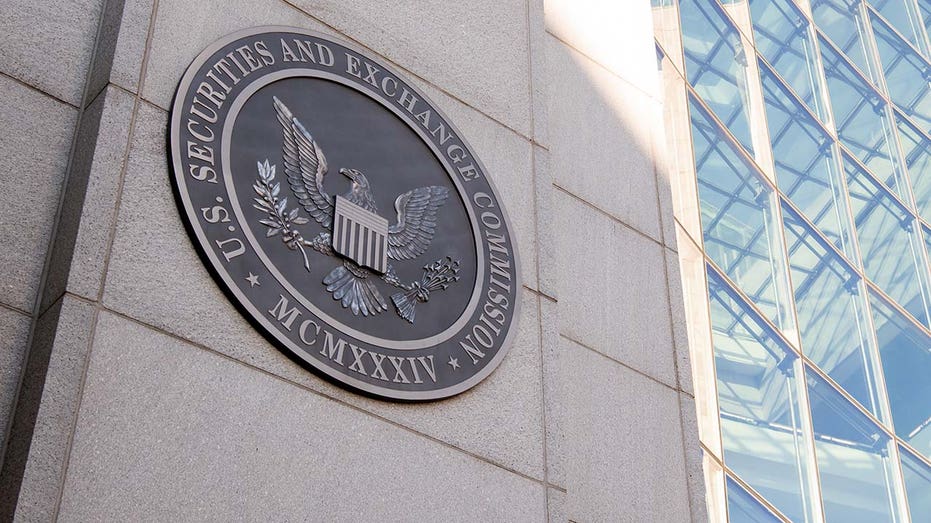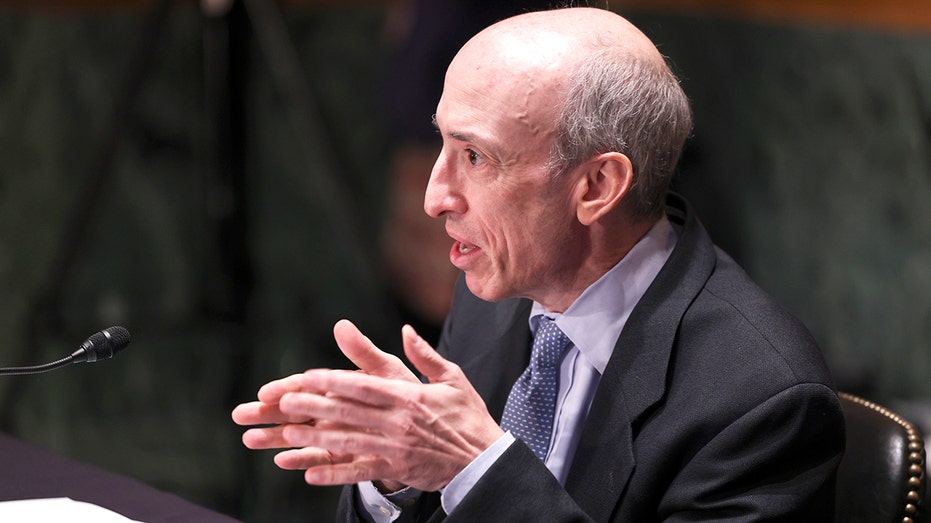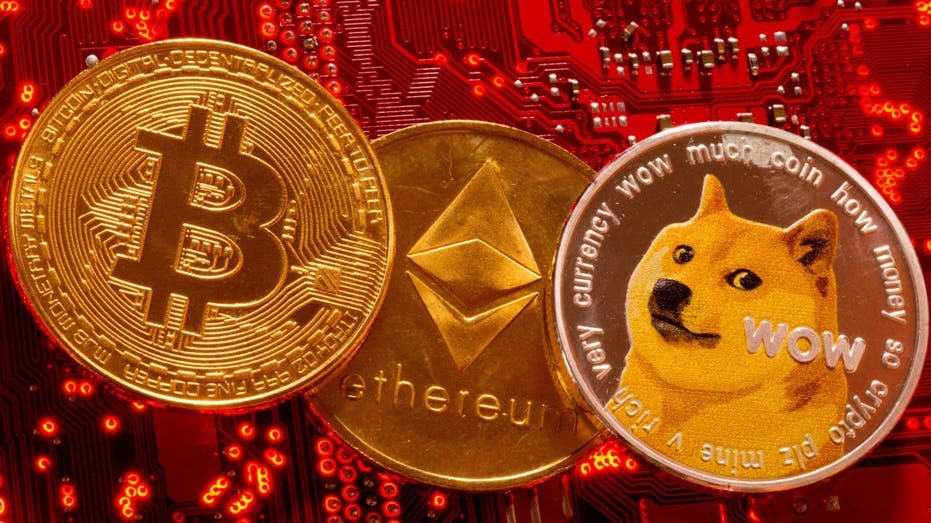SEC vs. Ripple verdict could come at pivotal time for crypto industry
Until the case gets settled, the crypto business is in a regulatory void
Crypto rebound after SVB collapse is ‘evidence’ the industry is a ‘hedge’: Brock Pierce
Bitcoin Foundation Chairman Brock Pierce reacts to cryptocurrencies rebounding despite the Silicon Valley Bank collapse on 'Varney & Co.'
As commuters rush through the arrivals hall at Washington D.C.‘s iconic Union Station, they are greeted with a phalanx of fast-food restaurants, coffee vendors and the occasional retail store. Around 100,000 people pass through each day, many of them Wall Street types taking the Amtrak from New York City to do government business. Others are local commuters scrambling to work from the DC suburbs and, of course, tourists visiting the nation’s capital.
Amid the chaos looms a large blue billboard with bold white lettering bearing the words "Crypto Means Business." Underneath reads the name of the billboard’s sponsor: "Ripple."
RIPPLE CEO SAYS LANDMARK LAWSUIT WILL BE DECIDED BY A JUDGE
Travelers disconnected from the crypto industry likely see the signage as just another corporate advertisement in a train station. Most probably don’t know that Ripple is one of the biggest names in the crypto industry, the vendor of a cross-border payments solution that uses blockchain technology.

The headquarters of the US Securities and Exchange Commission (SEC) is seen in Washington, DC, January 28, 2021. - An epic battle is unfolding on Wall Street, with a cast of characters clashing over the fate of GameStop, a struggling chain of video g ((Photo by SAUL LOEB/AFP via Getty Images) / Getty Images)
They also don’t know that the ad’s placement in Union Station is, in fact, quite symbolic. It’s located on the exact route commuting securities lawyers take on their way to the headquarters of Wall Street’s top cop, the U.S. Securities and Exchange Commission, whose lobby is located just down the hall.
For nearly two years, the SEC has been locked in a high-profile lawsuit with Ripple and the outcome could dictate the scope of crypto enforcement proposed by SEC Chairman Gary Gensler. The ad in Union Station is not just a way for the company to tout its product — it’s also a clear message from Ripple to the SEC that it's not backing down.
DISTRICT JUDGE CALLS OUT SEC FOR HYPOCRISY IN RIPPLE LAWSUIT
As FOX Business has previously reported, the SEC in 2020 filed charges alleging that Ripple and its executives violated securities laws by selling the digital token XRP to bankroll its business. The SEC contends Ripple should have registered XRP as a security. Ripple says XRP is not a security, thus the sales were totally legal.
Gensler, who became SEC chief in 2021, has aggressively pursued the civil litigation. People close to him say he’s hoping that a legal victory will cement his status as crypto’s chief regulator. More importantly for Gensler, it could give him carte blanche to declare just about every digital coin, except maybe bitcoin, an unregistered security as he seeks to reign in what he believes is rampant abuse and corruption in the $1 trillion industry.

The Securities and Exchange Commission is studying ways to make it more feasible for cryptocurrency trading platforms to register with the agency as exchanges, Chairman Gary Gensler said Monday Apr. 4th 2022 (Photo by Evelyn Hockstein-Pool/Getty Imag (Photo by Evelyn Hockstein-Pool/Getty Images / Getty Images)
As the case has dragged on through federal courts, the crypto business has been left in a regulatory void. Is the SEC or the Commodity Futures Trading Commission, the regulator of futures contracts and currencies, its primary regulator? Are digital assets securities, commodities, currencies or something else entirely?
This legal quandary will soon draw to a close. According to lawyers working on the case, the federal district judge from Manhattan, Analisa Torres, could make a key ruling possibly in the coming days on so-called summary judgment, which could hand either Ripple or the SEC a victory. The judge could also order the case go to trial, which could delay the industry’s much needed regulatory clarity for months, maybe even years.
An SEC spokesperson declined comment, as did a spokesperson for Ripple.
REGULATORY RIDDLE: AN INVESTIGATION INTO THE SEC V. RIPPLE CASE AND ITS CONSEQUENCES FOR CRYPTO
In recent months, Judge Torres has sided with Ripple on various motions, including its demands for emails and other documents from SEC officials in an effort to show the agency may have unfairly targeted Ripple. Those documents were also designed to show how the SEC may have failed to give Ripple what’s known as "fair notice" that its sales of XRP were illegal since the agency brought the case long after the company began issuing the tokens.
Until recently, observers believed the judge was inclined to side with Ripple, given what they viewed as her fair interpretation of the law and criticism of some of the litigation tactics used by SEC lawyers. Now, they’re not so sure. With the May implosion of the blockchain platform Terra, and the November collapse of the FTX crypto exchange, and the indictment of its founder Sam Bankman-Fried on fraud charges, many people inside the crypto industry say an outright win for Ripple could be difficult. The collapse of the two largest crypto-friendly banks, Silvergate and Signature, could also have an impact on the final outcome.
"On the core legal issue of whether Ripple offered unregistered securities to the public, I think the SEC has the stronger argument," said Marc Fagel, former Regional Director of the SEC’s San Francisco office. "The case is complicated by the question of whether Ripple had ‘fair notice’ that XRP was a security. Even there, I don’t see a compelling argument under legal precedent, even if missteps by the SEC along the way have brought it to the forefront."
Among the many reasons the outcome is important: to date, there has been no formal classification of digital assets. Crypto’s legal status, thus, is open to interpretation by the SEC and the CFTC, resulting in a turf war of sorts over which regulator should regulate the asset class. It would also decide whether the SEC’s current test for classifying securities should apply to digital assets. Known as the Howey Test, which resulted from a 1946 Supreme Court decision, it determines what qualifies as an investment contract, and thus is subject to U.S. securities laws.

FILE PHOTO: Representations of cryptocurrencies Bitcoin, Ethereum and DogeCoin are placed on PC motherboard in this illustration taken, June 29, 2021. REUTERS/Dado Ruvic/File Photo
The SEC’s main argument is that Ripple broke the law by selling XRP as an investment contract to buyers, whom, they say, were relying on the efforts of Ripple to boost their profits. If the judge sides with the SEC, that could mean many other digital coins will be fair game to be classified as unregistered securities.
While Ripple has not denied the sales of XRP occurred, the cryptocurrency company argues that they do not satisfy the Howey Test because there was never an investment contract between Ripple and buyers of the XRP token.
CRYPTO ISSUES 'NOT JUST IDIOSYNCRATIC’ TO THE SPACE, INDUSTRY EXPERT ARGUES
"Our point is, Ripple doesn’t have a contract. With whom is the contract? It isn’t a written contract, it’s not an oral contract, it’s not an implicit contract," said Ripple CEO Brad Garlinghouse in an interview with FOX Business’ The Claman Countdown in September.
Crypto industry poised for massive class action lawsuits against top exchanges: Gasparino
FOX Business senior correspondent Charlie Gasparino weighs in on longtime securities lawyer Tom Grady launching an investigation into Coinbase, Robinhood crypto offerings on 'The Claman Countdown.'
The issue surrounding the secondary market sales of XRP, meaning sales of the token to retail investors on exchanges, has made the case particularly important for the crypto investing public. When the SEC sued Ripple in December 2020, exchanges like Coinbase and Crypto.com de-listed XRP from their platforms, so investors could no longer buy or sell the token, effectively leaving their accounts in limbo.
Total losses to small investors and project developers using the XRP Ledger were said to total around $15 billion. After the SEC filed the case, the price of XRP fell 70% in just a few days. Today it's trading at $0.46 after hitting a high of $3.84 in 2018.
The situation sparked outrage among retail investors and resulted in the appointment of Rhode Island-based lawyer John Deaton as amicus curiae ("friend of the court"). Deaton currently represents the interests of 75,000 global XRP holders who were harmed by the lawsuit.
CLICK HERE TO READ MORE ON FOX BUSINESS
In addition to Deaton, fifteen other industry players and organizations, including Coinbase and The Blockchain Association, submitted amicus briefs either on behalf of Ripple or on behalf of the wider crypto industry. By comparison, the SEC received just two amicus briefs to support its case against Ripple.
"This case may set a precedent that could impact not only the digital asset industry, but also the capital markets," said Perianne Boring, founder and CEO of the Chamber of Digital Commerce in a statement to FOX Business. "Our preference is that industry actors have clear guidance on how to operate as opposed to being subject to regulation by enforcement."






















